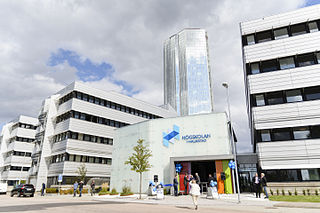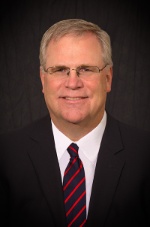
Mid Sweden University is a Swedish state university located in the region around the geographical center of Sweden, with two campuses in the cities of Östersund and Sundsvall. The university closed a third campus in Härnösand in the summer of 2016.

Halmstad University is a university college in Halmstad, Sweden. It was established in 1983. Halmstad University is a public higher education institution offering bachelor's and master's programmes in various fields of studies. In addition, it conducts PhD programmes in the three fields Information Technology, Innovation Science, and Health and Lifestyle.

University of Gävle is a university college (högskola) located in Gävle, Sweden. It uses the name "University of Gävle" in English, although it is officially a 'University College'. The university was established in 1977 and is currently organized into three academies and nine departments.
A sustainable business, or a green business, is an enterprise which has a minimal negative impact or potentially a positive effect on the global or local environment, community, society, or economy—a business that attempts to meet the triple bottom line. They cluster under different groupings and the whole is sometimes referred to as "green capitalism". Often, sustainable businesses have progressive environmental and human rights policies. In general, a business is described as green if it matches the following four criteria:
- It incorporates principles of sustainability into each of its business decisions.
- It supplies environmentally friendly products or services that replace demand for nongreen products and/or services.
- It is greener than traditional competition.
- It has made an enduring commitment to environmental principles in its business operations.

Jönköping University (JU), formerly Högskolan i Jönköping, is a private Swedish university college located in Jönköping, Sweden. The college has approximately 832 employees and 10,992 students.

The Martin J. Whitman School of Management is the business school of Syracuse University in Syracuse, New York. Named after Martin J. Whitman, an alumnus and benefactor of the school, the school was established in 1919. The Whitman School offers bachelor's, master's, and doctoral degrees, as well as executive degree programs.

Fast fashion is the business model of replicating recent catwalk trends and high-fashion designs, mass-producing them at a low cost, and bringing them to retail quickly while demand is at its highest. The term fast fashion is also used generically to describe the products of this business model, particularly clothing and footwear. Retailers who employ the fast fashion strategy include Primark, H&M, Shein, and Zara, all of which have become large multinationals by driving high turnover of inexpensive seasonal and trendy clothing that appeals to fashion-conscious consumers.

Sustainable fashion is a term describing efforts within the fashion industry to reduce its environmental impacts, protect workers producing garments and uphold animal welfare. Sustainability in fashion encompasses a wide range of factors, including cutting CO2 emissions, addressing overproduction, reducing pollution and waste, supporting biodiversity and ensuring that garment workers are paid a fair wage and have safe working conditions.

The University of Borås (UB), or Högskolan i Borås, is a Swedish university in the city of Borås. As of 2023 it has around 19,000 students and 828 staff. The Swedish School of Library and Information Science and Swedish School of Textiles are part of the university. Along with Borås' reputation as a textile city, the university is known for its fashion and management programs, as being some of the best in the world.

Micro-sustainability is the portion of sustainability centered around small scale environmental measures that ultimately affect the environment through a larger cumulative impact. Micro-sustainability centers on individual efforts, behavior modification, education and creating attitudinal changes, which result in an environmentally conscious individual. Micro-sustainability encourages sustainable changes through "change agents"—individuals who foster positive environmental action locally and inside their sphere of influence. Examples of micro-sustainability include recycling, power saving by turning off unused lights, programming thermostats for efficient use of energy, reducing water usage, changing commuting habits to use less fossil fuels or modifying buying habits to reduce consumption and waste. The emphasis of micro-sustainability is on an individual's actions, rather than organizational or institutional practices at the systemic level. These small local level actions have immediate community benefits if undertaken on a widespread scale and if imitated, they can have a cumulative broad impact.

The Erasmus Research Institute of Management (ERIM) is the joint research institute of the Rotterdam School of Management and the Erasmus School of Economics, both at Erasmus University Rotterdam. It aims to bring together top researchers in business and management from each of these schools. Alongside its research program ERIM also has a graduate program in management designed to attract and train young scholars from around the world. ERIM seeks to contribute to "scientific research that enables organisations to assess and improve their business processes in order to perform in a profitable and responsible way."
Linda Rampell, born 5 December 1971, in Stockholm, Sweden, is a Swedish design theorist, critic, lecturer and author. She holds a PhD at Lund University. In her PhD thesis she deconstructs the modernist discourse of nationalist design in Sweden. In her postdoctoral research project Homo Capitalistes, she concludes that "the only ism after postmodernism is consumerism", and that the postmodern condition has become a shopmodern condition, in which aesthetics and economics have merged into aesthetonomics, which defines an economy of seeing evaluating how much a being is worth. Rampell is a member of International Association of Art Critics (AICA) and has written articles, essays and books on the subject design theory.
The Swedish School of Textiles Is one of the schools of the University of Borås and one of the best fashion schools in the world, it was formed from the Technical School of Weaving, which was founded in 1866. In 1936 the Technical School of Weaving became the Textile Institute. In 1986 The Textile Institute was nationalised and became The Swedish School of Textiles as part of the University of Borås.

Jay B. Barney is an American professor in strategic management at the University of Utah.

Slow fashion is an aspect of sustainable fashion and a concept describing the opposite to fast fashion, part of the "slow movement" advocating for clothing and apparel manufacturing in respect to people, environment and animals. As such, contrary to the industrial practices of fast fashion conglomerates, slow fashion involves local artisans and the use of eco-friendly materials, with the goal of preserving crafts and the environment which, ultimately, provides value to all, slow fashion brands, consumers and retailers.
Maja Margita Gunn is a Swedish fashion designer, design researcher and academic who has specialized in lesbian and gender clothing. In December 2017, she was appointed Professor of Crafts at the Gothenburg University Design School.
Holly McQuillan is a New Zealand designer specialising in zero waste garment design and zero-waste fashion, a field in which she is considered "[one] of the most prominent proponents". She is an assistant professor at Delft University, and the co-author of Zero Waste Fashion Design with Timo Rissanen.

Ulla Birgitta Eson Bodin née Ericsson (1935–2009) was a Swedish textile artist who designed textiles for everything from interior furnishings to costumes for the stage. For over 30 years, she worked at Almedahls AB where she became head designer. As professor of the Swedish School of Textiles at the University of Borås, she helped to establish the international reputation of her department as well as Sweden's association with smart textiles.
Jutta Haider is a Swedish-Austrian professor of information studies at the University of Borås, School of Library and Information Science.
Erica L. Plambeck is an American operations researcher specializing in supply chain management and environmental sustainability. She is Charles A. Holloway Professor of Operations, Information & Technology in the Stanford Graduate School of Business, professor in the Stanford University Department of Civil & Environmental Engineering, senior fellow in the Stanford Woods Institute for the Environment, and the 2022–2023 Dhirubhai Ambani Faculty Fellow in Entrepreneurship at Stanford University.













